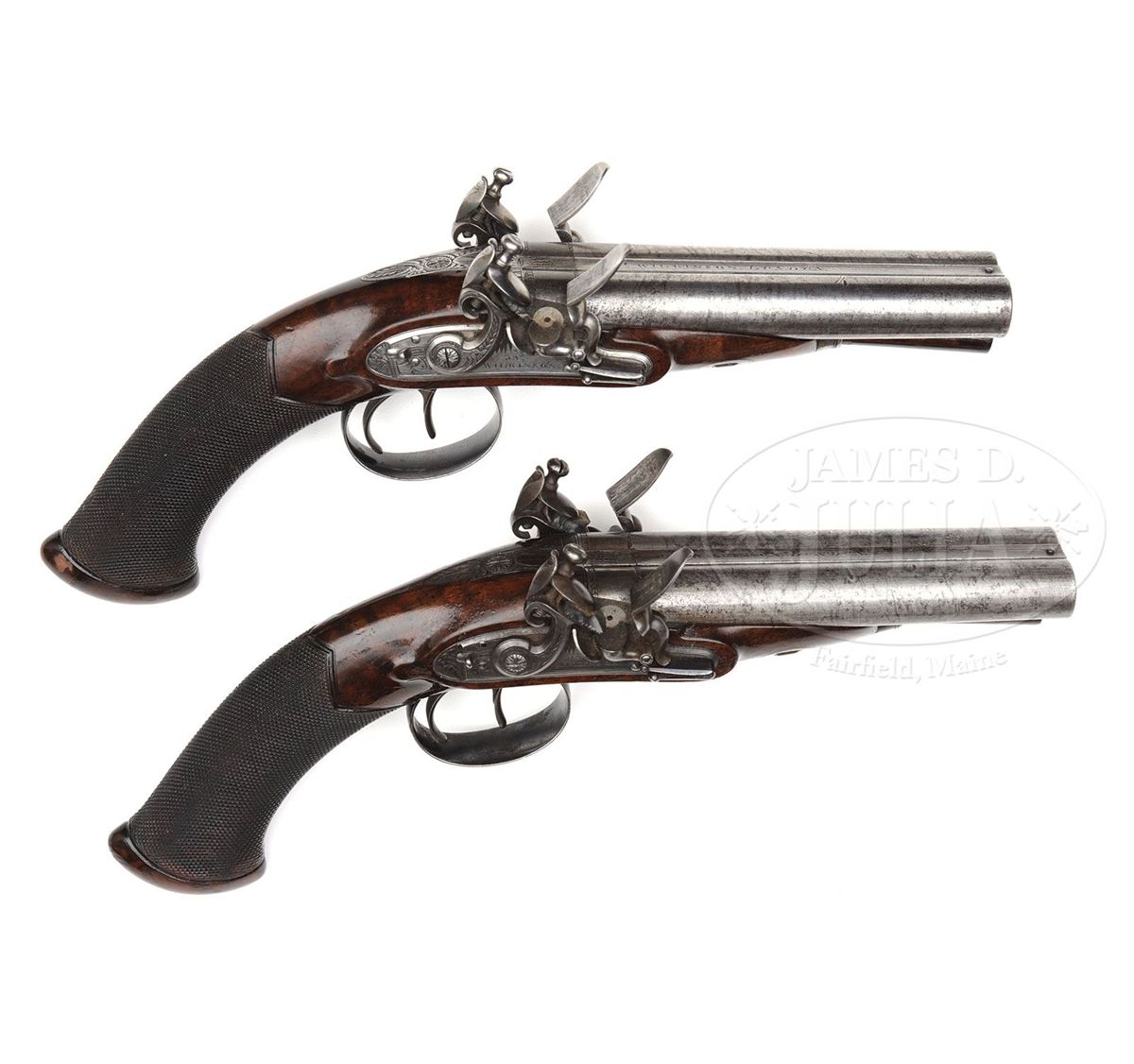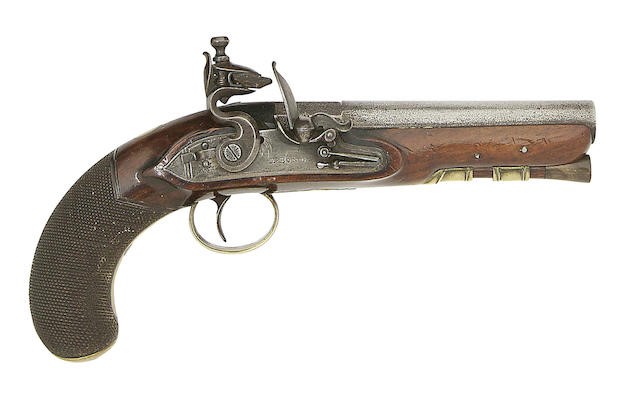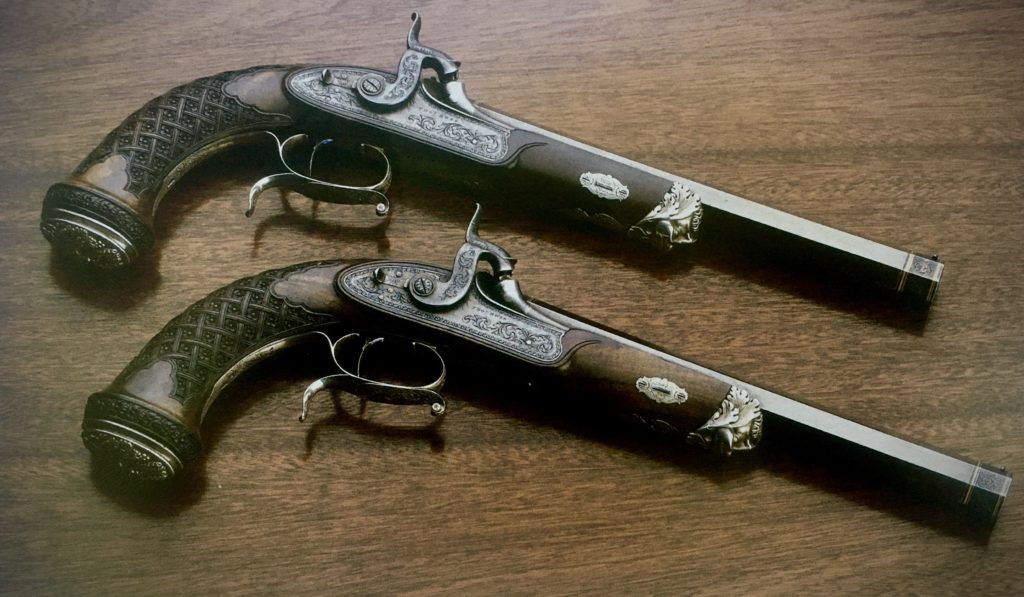By
Louisa Cornell
James Wilkinson, Gunmaker
No. 10 Ludgate Street
Established 1804
Henry Nock died in November, 1804 and listed no legal heirs in his will. He left his stock and business to James Wilkinson, his foreman. The pertinent entry in the will read:
I leave to my foreman, James Wilkinson,
my stock in trade and effects in Ludgate Hill and entreat him to carry on
the business for the benefit of my workmen in my said premises in
Ludgate Hill and I hereby give to Ann, the wife of James Wilkinson
mentioned in my said will, the sum of £100.
While Nock had no legal heirs, it is believed he had essentially adopted Ann and her brother, John, when their father, one of Nock’s workers, died. As Wilkinson frequently identified himself as Nock’s son-in-law most agree that is the case. This theory is credible as on later trade labels James Wilkinson refers to himself as “Successor and Son-in-Law to the Late Mr. Henry Nock.”
A label inside a case for a pair of pistols made after Wilkinson took over the business reads:
James Wilkinson
Gun Maker
To His Majesty
and the Hon East Indian Company
Successor to the late H. Nock
Ludgate Hill
London
James Wilkinson had been foreman and general manager of Nock’s many workshops all over London. He was, however, quite inventive himself and a superior businessman. Wilkinson became Gunmaker-in-Ordinary to the king in 1805. Contracts with the East India Company ensured the success of the business. The name became James Wilkinson & Son around 1818 when James’ son Henry joined.

Because of the company’s superior work in creating bayonets and swords it eventually became Wilkinson Sword and continued to make fine weapons until 2005. The company survives making razor blades and other products.
Edward James Bond
45 Cornhill
Established 1816
Took over father’s Gunmakers business at 59 Lombard Street up to 1810.
Gunmakers business at 45 Cornhill 1800 to 1816. A family business for several generations.
A 32-Bore Brass-Mounted Flintlock Pistol
1820

With two-stage barrel (light pitting overall), octagonal breech engraved with maker’s address along the top, foliate engraved tang, signed border engraved flat beveled lock lightly decorated with foliage and with stepped tail, engraved safety-catch, semi-rainproof pan and roller, figured full stock with chequered rounded butt, border engraved mounts comprising butt-cap, trigger-guard with pineapple finial and decorated with a Britannia shield and foliage on the bow, vacant brass escutcheon, slotted ramrod-pipes, and original horn-tipped ramrod with iron worm.
Edward London
50 London Wall, 1826-7
51 London Wall, 1828-66
Established 1826
This company appears to have had a fairly long history. There was an Edward London, gun maker of London Wall in 1734, who appeared as a witness in an attempted murder case. In 1838 there is record of Edward London, gun maker of 51 London Wall, insured with the Sun Fire Office. It is not, however, clear when the company went out of business.

Four bore percussion game rifle made by Edward London
Boss & Co. Gunmakers
73 James’s Street
Established 1812
The Boss family originated from Leicestershire and had no roots in gunmaking when William Boss began an apprenticeship in 1773, aged just 15. His commitment to becoming a gunmaker was clear, and he moved away from his family to Birmingham to be closer to his mentor; gun and pistol maker Thomas Ketland.
Excelling at his craft, and already making a name for himself, William Boss then moved to London where the finest guns were being produced. There he could further refine his skills and become a part of the dominating London gun industry.
Soon he found a new mentor: Joseph Manton, a leader in his field and a man who only employed top-rate journeymen which, by this time, William was now known.
Staying with Manton for a number of years, William fathered three sons during his time with the firm, each of whom became an apprentice to their father. Sadly, while teaching his youngest son Thomas the art of gunmaking, William died. At this time, the death of a gunmaking father marked the end of any apprenticeship for his remaining sons. But Manton made an exception for the 19-year-old Thomas and allowed him to continue with the firm as his natural talent for the craft was clear.
Eventually Thomas established a name for himself as a top gunmaker. Working mostly as an outworker, a position that saw him finishing guns for the best-known gunmakers of the time, was something he excelled at.
This way of working continued for many years and the sheer scale of the London gunmaking business at this time meant he was a man in demand. The quality of his workmanship ensured his reputation as a gunmaker of esteem across the city.
In 1812 Thomas placed adverts in newspapers addressed to gentlemen, sportsmen and others, announcing the establishment of Boss & Co. These adverts promoted ‘self-acting safety guns, constructed to remove all apprehension of danger as they cannot be discharged except when held in the shooting position’. These guns were manufactured ‘in a superior style of elegant workmanship’ by Thomas Boss of Edgware Road, London.
At this time Thomas provided home visits to potential customers by day, and at his private home of an evening, but that was soon to change.
As is true of any company wanting to make a name for itself amongst established competition, Thomas Boss knew the importance of image.
A home visit was a great way to start, but the monied gun buyers of London liked the kudos of visiting premises where they could touch and feel the product and see it being made. A move to the West End sent out the right message, and 73 James’s Street became the home of Boss & Co.
As the reputation of Boss & Co grew, so did the number of customers through the door. Soon Thomas Boss sought his own apprentices and journeyman gunmakers, needing up to ten skilled staff and two apprentices. Two of these new employees were nephews of Thomas Boss, men who would go on to play an important role in the future of Boss & Co as it developed.
